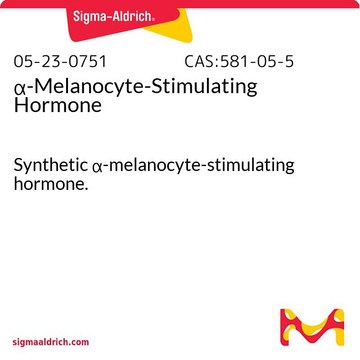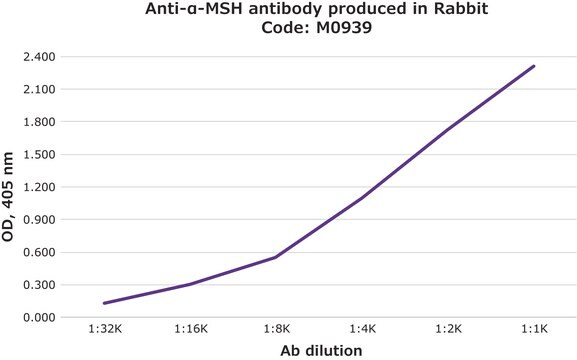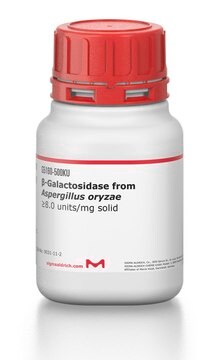M4603
Acetyl-[Nle4, Asp5, D-2-Nal7, Lys10]-cyclo-α-Melanocyte Stimulating Hormone Amide Fragment 4-10
≥95% (HPLC)
Synonym(s):
SHU9119
Sign Into View Organizational & Contract Pricing
All Photos(1)
About This Item
Empirical Formula (Hill Notation):
C54H71N15O9
Molecular Weight:
1074.24
MDL number:
UNSPSC Code:
51111800
NACRES:
NA.32
Recommended Products
Quality Level
Assay
≥95% (HPLC)
UniProt accession no.
storage temp.
−20°C
Gene Information
human ... POMC(5443)
Amino Acid Sequence
Ac-Nle-cyclo(Asp-His-Nal-Arg-Trp-Lys-NH2)
Biochem/physiol Actions
Screening analogs of the cyclic lactam melanocortin agonist MTII led to the identification of the agoutimimetic SHU9119. This compound shares pharmacological properties with the agouti peptide in that it is a potent antagonist of the melanocortin-4 receptor and a less potent antagonist of the melanocortin-3 receptor.
Storage Class Code
11 - Combustible Solids
WGK
WGK 3
Flash Point(F)
Not applicable
Flash Point(C)
Not applicable
Personal Protective Equipment
dust mask type N95 (US), Eyeshields, Gloves
Certificates of Analysis (COA)
Search for Certificates of Analysis (COA) by entering the products Lot/Batch Number. Lot and Batch Numbers can be found on a product’s label following the words ‘Lot’ or ‘Batch’.
Already Own This Product?
Find documentation for the products that you have recently purchased in the Document Library.
V J Hruby et al.
Journal of medicinal chemistry, 38(18), 3454-3461 (1995-09-01)
The cloning of the melanocyte-stimulating hormone (MSH) and adrenocorticotropic hormone (ACTH) receptors (MC1-R and MC2-R, respectively) recently has led to the identification of three additional melanocortin receptors, MC3-R, MC4-R, and MC5-R. The MC2 receptor primarily recognizes only ACTH peptides, but
Anna Fosch et al.
International journal of molecular sciences, 24(2) (2023-01-22)
Sensing of long-chain fatty acids (LCFA) in the hypothalamus modulates energy balance, and its disruption leads to obesity. To date, the effects of saturated or unsaturated LCFA on hypothalamic-brown adipose tissue (BAT) axis and the underlying mechanisms have remained largely
W Fan et al.
Nature, 385(6612), 165-168 (1997-01-09)
Dominant alleles at the agouti locus (A) cause an obesity syndrome in the mouse, as a consequence of ectopic expression of the agouti peptide. This peptide, normally only found in the skin, is a high-affinity antagonist of the melanocyte-stimulating hormone
Our team of scientists has experience in all areas of research including Life Science, Material Science, Chemical Synthesis, Chromatography, Analytical and many others.
Contact Technical Service

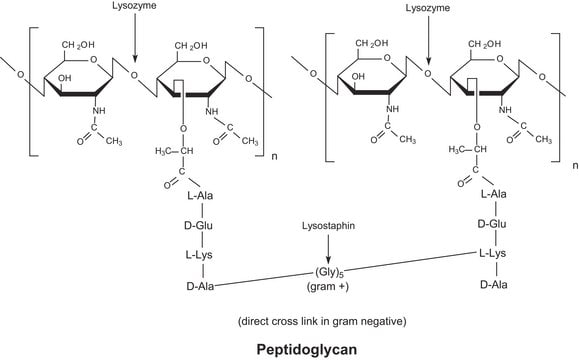
![[Nle4, D-Phe7]-α-Melanocyte Stimulating Hormone trifluoroacetate salt ≥95% (HPLC)](/deepweb/assets/sigmaaldrich/product/structures/276/187/9733edf4-6412-4f2b-8cc6-c3f9f3425d4d/640/9733edf4-6412-4f2b-8cc6-c3f9f3425d4d.png)
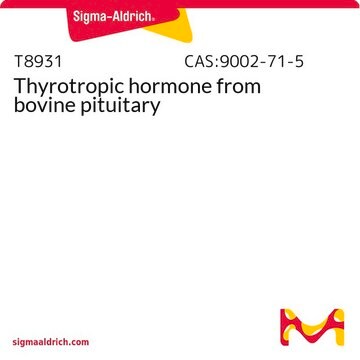
![[D-Trp7, Ala8, D-Phe10]-α-Melanocyte Stimulating Hormone Amide Fragment 6-11 ≥97% (HPLC)](/deepweb/assets/sigmaaldrich/product/structures/137/006/013a88e0-770d-44fb-8438-97b5d2d79d5c/640/013a88e0-770d-44fb-8438-97b5d2d79d5c.png)
